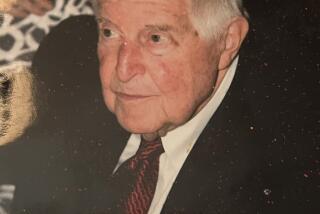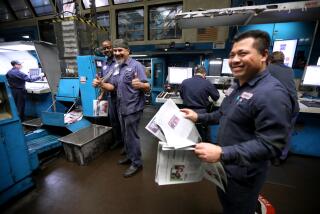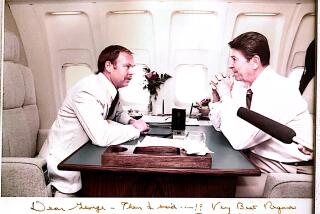L.W. ‘Bill’ Lane Jr. dies at 90; longtime Sunset publisher
L.W. “Bill” Lane Jr., a pioneering environmentalist and philanthropist who as the onetime co-owner and publisher of Sunset magazine helped define the postwar lifestyle of the American West, has died. He was 90.
Lane, who also served as a U.S. ambassador, died Saturday at Stanford Hospital in Palo Alto of respiratory failure after a brief illness, said a family spokeswoman.
“For the second half of the 20th century, he was a very important value maker and taste maker for the American West,” said Kevin Starr, a USC professor and former state librarian who worked with Lane on state cultural projects.
From 1959 to 1990, Lane published Sunset magazine, imbuing it with idealized yet practical advice for the millions of Americans who poured into the state after World War II.
Through the magazine, “he helped people appreciate the beauty of California,” Starr said. “He encouraged ordinary Americans to live well.”
Sunset had been in the family since 1928, when his advertising executive father came out from Iowa to San Francisco and paid $60,000 for the tourist-oriented publication that was created by Southern Pacific Railroad. The how-to periodical eventually became the most successful regional magazine in the United States.
After taking over the company, Bill and his younger brother, Mel — who ran Sunset’s book division — used the magazine as a platform for environmental concerns. Sunset had long advocated for the protection of the West’s natural heritage.
“There’s no magazine in the country, even National Geographic, that has done as much of what I would call participatory environmental coverage,” Bill Lane told the San Jose Mercury News in 1990.
Three years before the pesticide DDT was banned, the magazine ran an article in 1969 urging readers to stop buying the chemical and then refused to accept garden ads for pesticides containing the product, costing the magazine millions.
Banning of advertisers — tobacco, liquor, off-road vehicles shown off-roading — was a regular occurrence under Lane. Some advertisers were “just not our bag,” he once said.
When the brothers sold the company to Time Warner for $225 million in 1990, they said they had no heirs who wanted to run the firm.
As a philanthropist, Lane was a devoted member of the Stanford University class of 1942. He donated millions to the school, including $5 million to endow a university center to study the American West.
He often recounted how as a boy he gazed in awe when he first saw the wonders of the Yosemite Valley in 1929.
“From then on I made up my mind I was going to do everything I could to help places like that,” Lane told the San Jose Mercury News in 2004.
He remained true to that pledge, becoming deeply involved with the National Park Service. In 1995, the National Parks and Conservation Assn. named him conservationist of the year.
His many gifts to parks and conservation groups included $1 million to the Peninsula Open Space Trust, a Bay Area preservation group, to buy up scenic coastal land. He also gave $130,000 to the Yosemite Fund in 2007 to purchase a historic Yosemite Valley guest ledger.
Laurence William Lane Jr. was born Nov. 7, 1919, in Des Moines to Laurence William Lane and the former Ruth Bell.
When he was 16, he started working summers in Yosemite Valley. His first job was packing supplies for mule trains.
He attended Pomona College before transferring to Stanford to study journalism and, after graduating with a bachelor’s degree, he joined the Navy during World War II.
His duties included serving on a troop transporter in the Pacific and as a classified courier to Adm. Chester W. Nimitz, according to a Stanford biography.
Returning home four years later, he joined the family company, Lane Publishing, and began working his way up.
A cheery man with a booming voice, he was elected the first mayor of the town of Portola Valley in 1964 but resigned after 20 minutes, saying he was too busy to do the job.
From 1975 to 1976, he was an ambassador at large in the Pacific. President Reagan, with whom he rode horses, appointed Lane ambassador to Australia and Nauru, an island in the South Pacific. He held the post from 1985 to 1989.
An avid photographer and former pilot with a keen interest in aviation, Lane said last fall that he had recently ridden with his wife in a dirigible.
His brother, Mel, who was the first chairman of the California Coastal Commission, died at 85 in 2007.
Lane is survived by his wife, Jean; two daughters, Sharon Lane and Brenda Munks; a son, Robert Lane; and five grandchildren.
valerie.nelson@latimes.com







